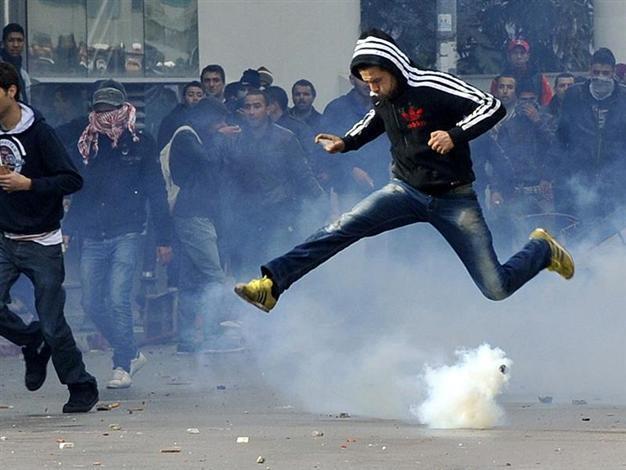Police fire tear gas at Tunis protesters
TUNIS - Agence France-Presse

Tunisian protester jumps amid smoke after police fired tear gas during a rallye outside the Interior ministry to protest after Tunisian opposition leader and outspoken government critic Chokri Belaid was shot dead with three bullets fired from close range, on February 6, 2013 in Tunis. AFP PHOTO / FETHI BELAID
Police on Thursday fired tear gas at demonstrators marching in central Tunis to protest the assassination of Chokri Belaid, a prominent opposition figure who was gunned down in broad daylight.Clashes erupted between police and anti-government protesters who approached the interior ministry on Habib Bourguiba Avenue, epicentre of the 2011 revolution which toppled ex-dictator Zine El Abidine Ben Ali's regime.
Police on Thursday fired tear gas at demonstrators marching in central Tunis to protest the assassination of Chokri Belaid, a prominent opposition figure who was gunned down in broad daylight.
Clashes erupted between police and anti-government protesters who approached the interior ministry on Habib Bourguiba Avenue, epicentre of the 2011 revolution which toppled ex-dictator Zine El Abidine Ben Ali's regime.
Tunisia's main trade union calls general strike on Friday
Tunisia's main trade union called a general strike on Friday, to coincide with the funeral of slain opposition figure Chokri Belaid, it announced on its official website.
"The General Union of Tunisian Workers (UGTT) decided to call a general strike on Friday during an extraordinary meeting (Thursday) of its leaders," it said.
Tunisia fears fresh violence after political assassination
Police on Thursday deployed in force in Tunis amid fears the murder of an outspoken opposition leader could reignite nationwide violence, as the ruling Islamists broke ranks over how to defuse the crisis.
As lawyers, judges and some teachers kicked off a two-day strike to protest Wednesday's assassination of vocal government critic Chokri Belaid, police swarmed into the city centre in security trucks, buses and vans.
Most of the forces were deployed in Habib Bourguiba Avenue, epicentre of the 2011 uprising that toppled ex-dictator Zine El Abidine Ben Ali and where thousands had gathered Wednesday in scenes reminiscent of the revolution, while roads near the interior ministry were closed to traffic.
Despite the police presence, around 300 protesters marched down the avenue chanting, "The people want the fall of the regime." Police did not immediately react.
Shops reopened in centre of the city, but many of them kept their shutters down to protect their windows.
The influential labour union, UGTT, meanwhile, was meeting to decide its course of action in the wake of Belaid's killing by a lone gunman outside his home on Wednesday.
While opposition parties and unions refrained from calling people onto the streets Thursday, spontaneous protests that erupted in a dozen towns and cities the previous day served as a reminder that social upheaval remains a real threat.
This was emphasised when anti-Islamist protesters clashed early Thursday afternoon with police in the central town of Gafsa, throwing petrol bombs at the police, who fired large quantities of tear gas to disperse them.
On Wednesday, one policeman was killed after being hit by rocks in Tunis, while protesters torched and ransacked offices of the ruling Islamist Ennahda party in a number of towns as news spread of Belaid's assassination.
Ennahda has been squarely accused by Belaid's family of being behind the killing, which was carried out by a lone gunman -- charges it vigorously denies.
Prime Minister Hamadi Jebali, who hails from Ennahda, said in a televised address on Wednesday that he would form a new administration of non-political technocrats ahead of fresh elections.
"I have decided to form a government of competent nationals without political affiliation, which will have a mandate limited to managing the affairs of the country until elections are held in the shortest possible time," he said.
Jebali, who is expected to remain in his post, did not specify that he was dissolving the existing government, nor did he set a date for the reshuffle which must be confirmed by the national assembly.
But Abdelhamid Jelassi, a member of Ennahda's political bureau, criticised Jebali's decision, reflecting the divisions within the party.
"As far as we are concerned, our country still needs a government coalition based on the results of the elections on October 23, 2011" that Ennahda won, said Jelassi.
Jelassi said the prime minister, who is number two in Ennahda, "had not consulted the party's political bureau before making the announcement".
The party has not yet issued a statement, nor has its veteran leader Rached Ghannouchi reacted to Jebali's speech, although he did call for a "national reconciliation," speaking on state television after Wednesday's assassination.
Jebali is considered a moderate within his party and has for months been locked in negotiations with the secular parties in the coalition who have demanded that some of the ministries be assigned to independents, a move rejected by Ennahda hardliners.
Four opposition groups including Belaid's Popular Front bloc said they were pulling out of the National Constituent Assembly (NCA), which was elected in October 2011 but has failed to draft a new constitution.
Belaid's family said his funeral will take place on Friday after the main weekly prayers.
Hundreds gathered on Thursday outside his family home to pay their respects, witnesses said.
















